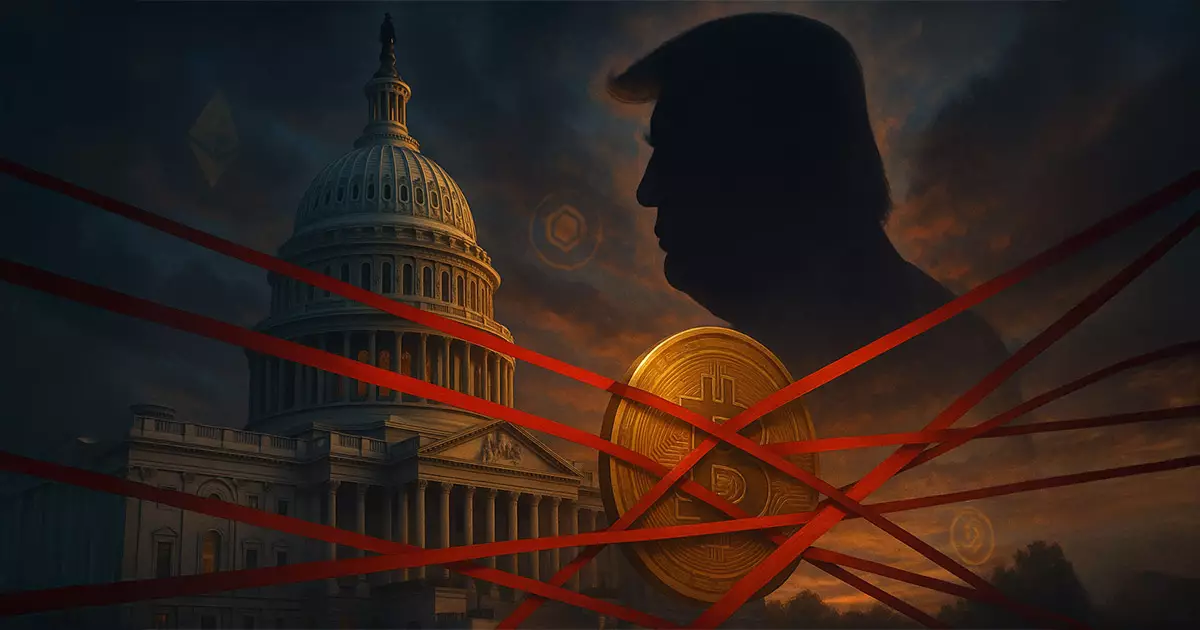In recent discussions surrounding U.S. President Donald Trump’s seizure of the cryptocurrency landscape, the conversation takes a darker turn as concerns about personal enrichment and potential conflicts of interest loom large. Anticipated policies, particularly those regarding stablecoins, have not only stalled due to these ethical concerns but have also cast shadows on the broader regulatory framework governing the U.S. cryptocurrency ecosystem. Prominent voices within the financial community, such as Ryan Gilbert, founder of Launchpad Capital, express disappointment, stating, “It’s unfortunate that personal business is getting in the way of good policy.” Such statements underscore a palpable frustration as the boundaries between personal profit and public governance blur alarmingly.
The Guiding and Establishing National Innovation for U.S. Stablecoins (GENIUS) Act, heralded as a pivotal legislative effort aimed at creating clarity in the crypto space, was viewed as the most likely candidate for bipartisan support. Despite its promise, the bill fell short in the Senate, facing a disheartening defeat with a narrow 48-49 vote. Katrina Paglia, chief legal officer at Pantera Capital, was left disheartened but unsurprised, reflecting a deep-seated belief that good policy is often derailed by personal ambitions.
Trump’s Uncomfortable Crypto Landscape
That this impasse is now intertwined with Trump’s personal ventures raises severe ethical questions. His engagement in the crypto space, including the controversial debut of the $TRUMP memecoin just days before his inauguration, highlights a troubling intersection between private enterprise and public trust. While the initial surge of the memecoin to an exhilarating high of $75 appeared promising, the subsequent plummet led inexperienced investors to suffer crippling losses exceeding $2 billion—a vivid illustration of how personal gain can come at the expense of the public.
A shocking twist comes from the reported earnings of Trump-affiliated companies that seized approximately $100 million in trading fees in just a few weeks post-launch. Meanwhile, the political landscape grows murkier with reports of former administration officials negotiating stakes in entities like Binance, which has a notorious history of regulatory violations. The fact that these financial machinations coincide with serious public policy discussions raises profound questions about the integrity of our political system.
Corruption in Plain Sight
As assertions of Trump’s personal wealth—derived from cryptocurrency ventures—grow louder, critics are quick to label his actions as clear instances of corruption. Congresswoman Maxine Waters recently stated that Trump seemingly cashed in on his presidency, stating bluntly, “Trump ran on a campaign to put more money in the pockets of Americans—turns out he just meant his pockets and those of his cronies.” This growing sentiment echoes a widespread belief among many that the current debate is not merely about stablecoin legislation but rather a fight against an evolving culture of corruption that now includes cryptocurrency.
This notion of corruption is compounded by reports revealing nine Senate Democrats withholding support for the GENIUS Act unless significant revisions addressing national security and money-laundering concerns were made. Saturday’s discussions reflected urgent calls to investigation and accountability, fundamentally questioning the ethics of how long-serving political figures can leverage their positions for personal financial gain. Herein lies a crisis of integrity that could undermine the very economic principles that underpin American democracy.
The Fight for Legislative Integrity
Amid these swirling controversies, several legislators are stepping up to reform systemic issues they believe are being exploited. Senator Mark Kelly’s introduction of the End Crypto Corruption Act aims to eliminate conflicts of interest by prohibiting Congress members and their families from directly endorsing or engaging in cryptocurrency ventures. This legislative movement represents a critical countermeasure to the financial impropriety increasingly associated with Trump and echoes a broader concern about the influence of money in politics.
Despite the revelations and ongoing investigations, there’s an uncanny optimism among legislators that the GENIUS Act will eventually see the light of day. Negotiations continue post-defeat, with many pushing for swift re-evaluation to cement a regulatory path forward. However, significant hurdles remain in disentangling regulatory investment from the political influence that many believe is inherently corrupt, raising the stakes for the future of cryptocurrency governance.
The urgency of this moment cannot be overstated, as lawmakers must tread carefully on the path to rectify systemic issues, preserving not just fiscal integrity but also public confidence in the governance of emerging financial technologies. The ongoing saga beguiles us, testing the resilience of American democracy against the tide of personal gain that threatens to undermine the very fabric of our political discourse.















